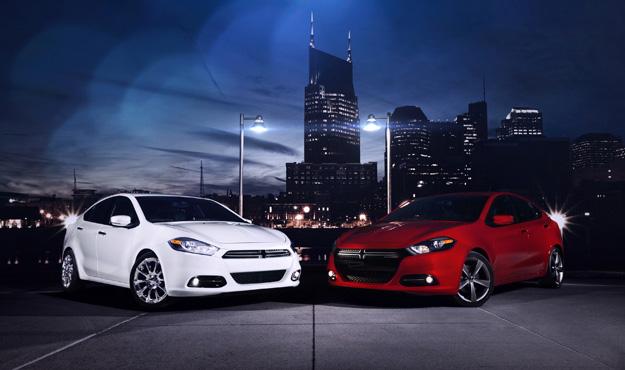 The new Dodge Dart is a promising first collaboration for Chrysler and Fiat, but it doesn’t achieve the magic 40 mpg (highway) that every compact car is expected to, falling just short of that goal with 39 mpg highway. Now, Dodge has rectified that with the 2013 Dart Aero, which achieves 41 mpg highway with a manual transmission, and 40 mpg with an automatic.
The new Dodge Dart is a promising first collaboration for Chrysler and Fiat, but it doesn’t achieve the magic 40 mpg (highway) that every compact car is expected to, falling just short of that goal with 39 mpg highway. Now, Dodge has rectified that with the 2013 Dart Aero, which achieves 41 mpg highway with a manual transmission, and 40 mpg with an automatic.
The Dart Aero is a fuel economy special like the Ford Focus SFE and Chevrolet Cruze Eco. Like its Detroit rivals, the Dart uses aerodynamic tricks like grille shutters and underbody panels to reduce drag, as well as low-rolling resistance tires. All of that is needed for one to two mpg.
Under the hood is the 1.4-liter turbocharged inline-four found in other Darts and the Fiat 500 Abarth. In the Aero, it produces the same 160 horsepower and 184 pound-feet of torque it does in non-Aero Darts.
Now that the Dart has joined the 40 mpg club, it will have to fend off competition from the Ford and Chevy fuel economy specials, as well as the Honda Civic HF. The Mazda 3 and Hyundai Elantra also return 40 mpg, without any add-ons. Nissan is claiming 40 mpg for its redesigned 2013 Sentra (with the optional FE+ package), but that car hasn’t completed EPA testing.
In highway mileage, it’s nearly a dead heat, with the manual transmission Crzue boasting 42 mpg, the Dart and Civic at 41, and the rest of the packing at an even 40 mpg.
In city driving, there is a pretty steep drop-off in mileage. The Dart comes in last place here, with 27 mpg city. The rest of the pack achieves 28 or 29 mpg.
The Dodge does have some advantages outside the realm of fuel economy. At $20,090 with destination, the Dart is only undercut by the $17,740 Elantra and the $20,020 Mazda.
For that price, Dart buyers get more than most competitors. The Dart is tied with the Focus SFE for most horsepower in the 40 mpg compact car class. It also gets niceties like a leather-wrapped steering wheel, auto headlights, and “racetrack” LED taillights from the upscale Dart Limited. As with other Darts, an 8.4-inch touchscreen, 7-inch reconfigurable TFT gauge cluster, and wireless charging mat are optional.
For compact cars, 40 mpg highway is becoming more of a standard than a selling point. The Dart Aero’s modifications meet that standard, but it’s hard to pick a clear fuel economy winner when the numbers are this close. The Aero’s strongest selling point will probably be the fact that it’s a Dart: it puts good fuel economy in an attractive package.


